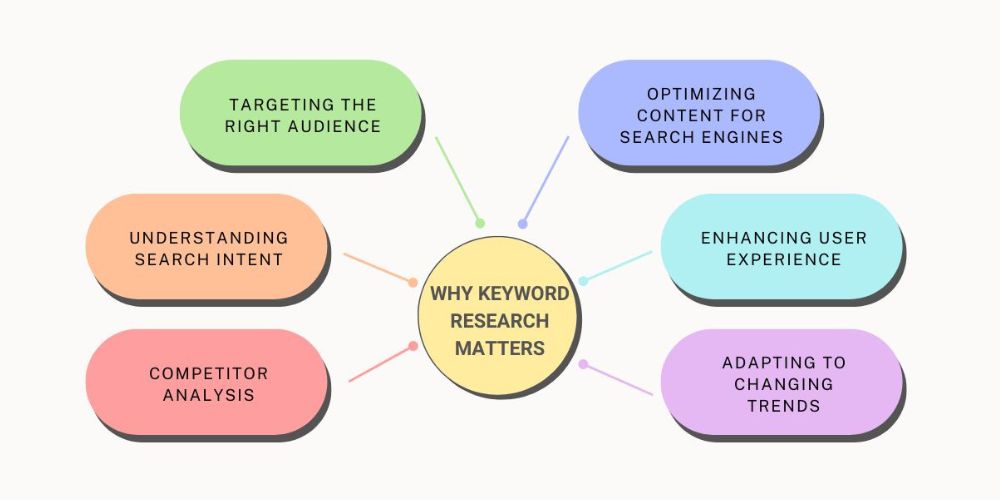Search Engine Optimization (SEO) is a fundamental strategy for driving organic traffic to websites. One of the most important aspects of SEO is keyword research. Understanding and using the right keywords on your website can make a big difference in how easily people find you online. Whether you’re a seasoned digital marketer or a beginner just stepping into the field, understanding the importance of keyword research is essential for achieving online success.
What is Keyword Research?
Keyword research is the process of finding and analyzing the words and phrases that people use when they search for things online. These terms, known as keywords, are what connect the user’s search intent with the content on your website. Effective keyword research involves discovering the words and phrases that are relevant to your business, have a high search volume, and possess a level of competition that you can realistically compete with.
Why Keyword Research Matters for On-Page SEO

Targeting the Right Audience
Keyword research helps you identify the specific terms your target audience uses when searching for information, products, or services related to your business. By optimizing your website’s content with these keywords, you can attract the right audience – those who are actively seeking what you offer. This increases your website traffic and also enhances the likelihood of converting visitors into customers.
Understanding Search Intent
Search intent means the purpose behind what a person is searching for. Are they looking for information, wanting to buy something, or just browsing? Keyword research helps you understand why people are searching certain terms, so you can create content that fits their needs. When your content matches what they want, it can help your site rank higher and give visitors a better experience.
Competitor Analysis
Keyword research also lets you see what keywords your competitors are targeting. By analyzing the keywords your competitors are targeting, you can identify opportunities to compete for the same audience or discover untapped niches. This competitive analysis helps you refine your keyword strategy and position your content more effectively in the search results.
Optimizing Content for Search Engines
Once you’ve identified the right keywords, the next step is to incorporate them into your on-page SEO elements. These elements include:
- Title Tags: The title tag is one of the most critical on-page SEO elements. It tells both search engines and users what your page is about. Including your target keyword in the title tag can significantly impact your rankings.
- Meta Descriptions: While meta descriptions don’t directly influence rankings, they do affect click-through rates. A good description with your keyword can encourage people to click on your link in the search results.
- Headings: Using keywords in your headings (H1, H2, H3, etc.) helps structure your content and signals to search engines what the most important topics on your page are.
- Content Body: The main body of your content should naturally incorporate your keywords. However, avoid keyword stuffing – as this can cause problems with search engines. Instead, focus on writing high-quality content that meets the reader’s needs while naturally fitting in the keywords.
- URL Structure: Including keywords in your URLs can enhance the SEO-friendliness of your website. A clear and concise URL that includes the target keyword provides both users and search engines with a better understanding of your page’s content.
Enhancing User Experience
User experience (UX) is a crucial factor in SEO. When users land on your website, they should be able to find the information they’re looking for easily. By conducting keyword research, you can create content that is relevant, informative, and easy to navigate. This not only keeps users engaged but also reduces bounce rates, which can positively impact your search engine rankings.
Adapting to Changing Trends
The digital landscape is constantly changing, and so are search trends. Regular keyword research allows you to stay ahead of the curve by adapting to new trends and shifts in user behavior. For example, the rise of voice search has led to an increase in long-tail keywords and conversational queries. By staying updated with the latest trends, you can adjust your keyword strategy and maintain your competitive edge.
The Process of Keyword Research
Effective keyword research involves several steps:
- Brainstorming: Start by brainstorming a list of topics related to your business. Think about the terms your target audience might use when searching for your products or services.
- Using Keyword Research Tools: Tools like Google Keyword Planner, Ahrefs, SEMrush, and Moz Keyword Explorer can help you identify relevant keywords, assess their search volume, and analyze their competition.
- Analyzing Competitors: Look at the keywords your competitors are ranking for. This can provide valuable insights into potential opportunities and gaps in your strategy.
- Selecting Target Keywords: Choose a mix of short-tail and long-tail keywords. Short-tail keywords are broad and highly competitive, while long-tail keywords are more specific and often have lower competition.
- Implementing Keywords in On-Page SEO: Once you’ve selected your target keywords, strategically incorporate them into your on-page SEO elements, as discussed earlier.
- Monitoring and Adjusting: SEO is not a one-time task. Regularly monitor your keyword performance using tools like Google Analytics and adjust your strategy as needed to improve your rankings.
Conclusion:
Keyword research is the foundation of any successful on-page SEO strategy. It not only helps you understand what your audience is searching for but also enables you to optimize your content to meet their needs. By investing time in thorough keyword research, you can enhance your website’s visibility, attract the right audience, and ultimately achieve your business goals.
At our digital marketing institute in Dadar, we emphasize the importance of keyword research for SEO success. Join our advanced digital marketing course to learn the latest techniques and strategies that will help you thrive in the fast-paced world of digital marketing.









